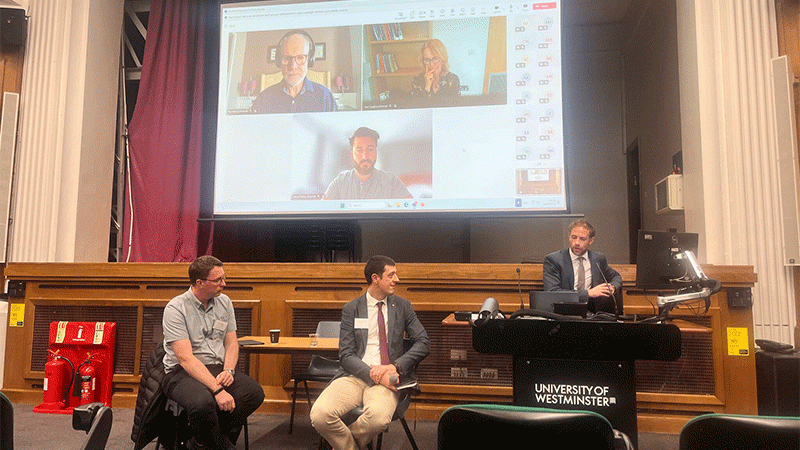The University of Westminster has launched the Centre for Legal Education and the Legal Profession (CLELP), a dynamic hub for research and innovation dedicated to addressing the key challenges shaping today’s legal system. To mark the opening of the centre, the University hosted a symposium to bring together global experts, academics, practitioners and students to explore how AI can be ethically and effectively embedded into legal education and practice.

Held on 11 September at Westminster Law School’s Little Titchfield Street site and online, the hybrid event discussed ways new technologies can be used within both legal education and practice to transform the industry and support future lawyers, such as curriculum changes and assessment reform.
The symposium was organised by Dr Marloes Spreeuw, Principal Lecturer in Law and Director of the CLELP, and opened with a keynote address by Professor Lisa Webley from the University of Birmingham, who reflected on the legal profession, the rule of law and AI.
Across three rounds of parallel sessions, speakers from universities across the UK and around the world showcased cutting-edge research and experiments. Presentations explored topics such as AI literacy and digital competencies in law schools; generative AI and assessment redesign; and ethics, bias and academic integrity in the age of AI.
The panel sessions were followed by a roundtable discussion on the impact of AI and technology on law, legal education and the legal profession, featuring lecturers from across the UK. Professor Luke Mason, Head of Westminster Law School then delivered the closing keynote titled Legal Thinking as a Technology During Technological Change: Old Modalities and New Modes, before guests gathered for a networking reception.
The CLELP studies how the profession and legal services market are changing and how legal education in law schools is evolving through evidence-based, legal and social research. Its Legal Careers, Employability and Professional Development Hub supports law students in exploring a wide range of career pathways.
The Centre’s members collaborate across themes that shape modern legal education and practice, including legal technology and generative AI, clinical legal education, equality, diversity and inclusion in the industry, legal ethics and professional regulation, access and widening participation, careers, curriculum design and communities of practice.
The symposium was generously funded by the Association of Law Teachers and The Law Teacher: The International Journal of Legal Education.
About the symposium, Dr Spreeuw said: “It was fantastic to see so many colleagues and students come together to share ideas and reflect on how AI is reshaping the future of legal education and the profession. The energy, curiosity and engagement throughout the day made the event a real success.”
This event and the launch of the Centre directly contributes to the United Nations Sustainable Development Goals (SDG) 4: Quality Education, 9: Industry, Innovation and Infrastructure and 16: Peace, Justice and Strong Institutions. Since 2019, the University of Westminster has used the SDGs holistically to frame strategic decisions to help students and colleagues fulfil their potential and contribute to a more sustainable, equitable and healthier society.
Learn more about the Centre for Legal Education and the Legal Profession at the University of Westminster.






